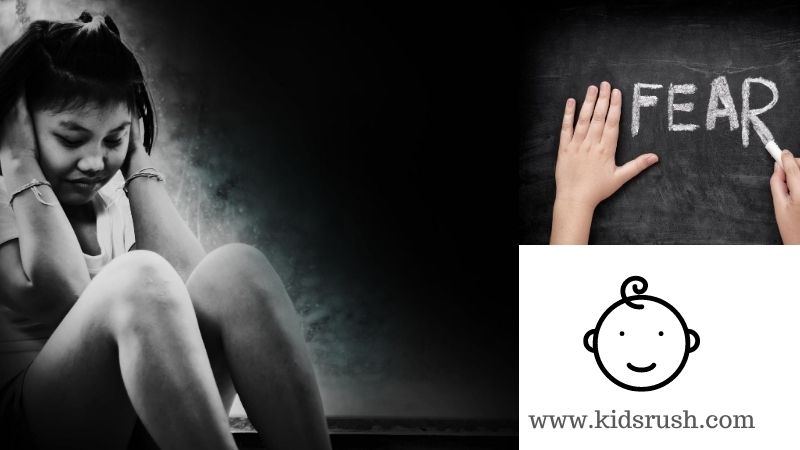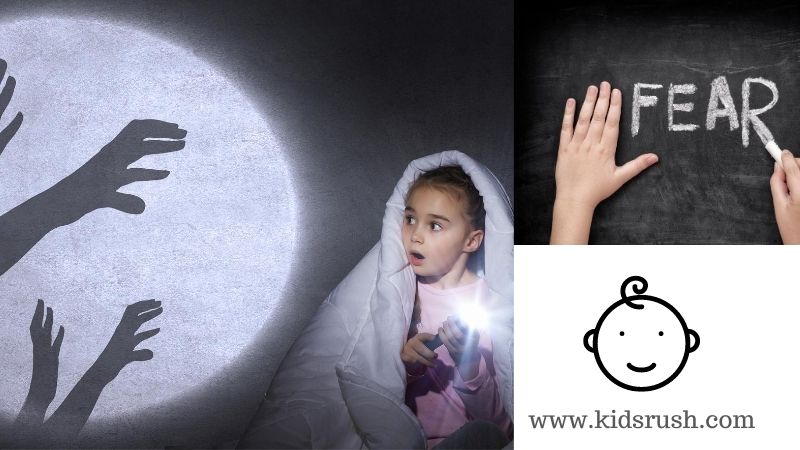Step by step guide to help your child overcome his fears:
In all their lives, human beings will always be confronted with fear, but this fear is felt to different degrees. Who are we afraid of? Is it from a family member, school, friend, group, community, or country? All of these concerns give some importance to the degree of fear, and if it is a country that is the source of this terror, you can imagine how frightening it must be.
However, if a friend is a cause, you won’t be so scared. All of these affect feelings and behavior. Additionally, overthinking a situation causes the brain to perceive things from a negative perspective. Such behavior in a teenager will denote a lack of confidence, and he (or she) may subsequently have a trauma. If you have seen something very scary and painful, chances are you will never be able to forget it, but if you have been through that moment you will not be able to forget how you felt. When a child is tormented by the fear of monsters, ghosts, or any demon, you can help him overcome this, and to do this you must be understanding, caring, and try to make suggestions for the child to help overcome fear.
Understanding the child’s fear
Make an effort to understand your child’s fear
Young children are still in a phase of discovering the world in which they live. Their imaginations are still developing, so anything they hear or see in life can lead to the production of frightening mental images. It’s these kinds of things that lead them to imagine that there is a monster in the darkroom and to be afraid of the dark. Children become fearful of different ages, to varying degrees, and in different situations. Therefore, there is no propitious way to overcome fear. Rather, it should be tailored according to your child’s stage of development and ability to deal with stress.
Read Also
- Solidarity: Educate children in values
- Guide for parents to teach your child not to hit others
- Table to apply discipline to children according to their age
Chat with your child
Chatting with your child will make them feel more comfortable. Talking with him will help your child overcome his fears. You have to allow him to share what scares him with you. Tell him to explain what scares him and why. It is also important that you can allow him to explain his feelings to you. Let him know about your concern while he talks to you about what scares him. Admit to her how scared you were of several things as a kid and her age. This empathy will undoubtedly strengthen your bond, and you will notice that your child will begin to realize that you care about them and are concerned about their feelings.
Take fear seriously
Don’t ignore your child’s fear

If your child is particularly afraid of a neighbor, parent, or caregiver, know that you have a duty not to ignore this or force him to live with it. Instead, discuss it with him and allow him to explain what makes him fearful of this person. Even if you feel that the person is unlikely to harm them, you should give your child the benefit of the doubt.
Avoid making fun of your child’s fear
Making fun of the fear a child feels won’t make them less fearful. On the contrary, it will increase his anxiety and at the same time reduce his self-esteem. This state of affairs can lead to much bigger problems like the development of a phobia (which is an advanced state of fear). Your child will only be able to overcome his fear if he (or she) enjoys your attention and love. Neglect will only arouse negative emotions at her level.
Give the right signal to help your child overcome his fears
You should avoid talking badly to your child about their fear by saying things like “stop pretending”, “don’t be afraid”, “look, your friend is not afraid”, etc. If you react in this way, the child will think that it is wrong to be afraid, and he (or she) will stop expressing his fears to you. What you should do instead is tell them that it’s okay to be scared and explain that it’s okay to share their fear with someone else and ask for help.
Help the child overcome fear

Avoid forcing your child to do things they are afraid of
Forcing the child will undoubtedly increase the fear he feels. To figure it out, you just have to think about how you would react if you were forced to go bungee jumping or keep a spooky bug in your hand. You must therefore allow your child to take all his time to adapt and overcome the fear that animates him. Support him by showing him all the attention and love possible. Read another article from kidsrush.com which describes how to entertain your children.
Show bravery to help your child overcome his fears
One thing is certain, your child will always follow the actions you take. If you panic about a given situation, know that it is very likely that he will react in the same way too. Your child will think that if someone or something is safe for you, it is also safe for them. Also, you should avoid causing him to be frightened by panicking whenever you feel like he might get hurt. Instead, just get close to him to help him and take the trouble to calmly explain to him what he should or should not do to keep him safe.
Keep your child away from fearful characters
A young child cannot tell the difference between fiction and truth. Children are afraid of the imaginary characters they see on television. For this, you need to make sure that yours does not follow the scary TV shows. Plus, give him the chance to understand the difference between reality and fantasy by teaching him how comics and movies are produced simply.
Offer to walk with him to the place that scares him
You can suggest that your child take a walk with you to visit the room, the house, or any place he is afraid of. Open all the doors, look under the bed, and turn on the light to show her that there is nothing to be afraid of. If your child is frightened by dark images, sounds, then consider leading a discussion about what might be causing these sounds without being judgmental.
Use humor to help your child overcome his fears
Ask your child to describe to you the monster he thinks he sees and is afraid of. You can add fun accessories to this image like a silly hat or checkered underwear. For example, you can assume that this imaginary monster asks to use the kid’s bathroom because he really can’t hold back, or he’s sad because he doesn’t have much. friends. As you can see, you have to challenge the child’s feelings of compassion. This way of proceeding will humanize the image of the monster and make it less frightening and more sympathetic.
- Fill a spray bottle with a mixture of water and lavender or any other aromatic oil. Stick a large tag on it that says “monster spray” and tell your child that this mixture will keep all the monsters they are afraid of, not only because they are afraid of water, but also because of. the smell that gives them nasal infections. Spray a few drops of the spray into the air and reassure your child that no monster is crazy enough to approach right now.
- Put a dish on the doorstep and pour in some goodies. Then tell your child that these are highly prized by monsters around the world, but as soon as they consume them they become nice and lovable, just like puppies.
- Take a ball of yarn and put a “monster barrier” around your child’s bed. Then reassure him that the monsters cannot approach this kind of barrier and that they will magically disappear and be crushed if they ever try.
Make sure your child feels loved
Make an effort to make it clear to your child that you will always be there to protect them.
Advice from kidsrush.com to help your child overcome his fears
- A good amount of milk poured into a special teacup can help at night. Add a teabag that doesn’t contain caffeine, like vanilla rooibos tea, to get a great taste.
- You can put some lavender in a spray bottle. Spray this solution into the air and tell your child that it will allow them to get rid of those negative things that bother them. Lavender is a calming herb, and it will help calm the child. Besides, he will see that you have vaporized something, which will therefore allow him to be reassured.
- There are a plethora of books that deal with lovable monsters and ghosts. These are available and you can buy them.
- If your child continues to be afraid, you can lie on the bed next to them until they fall asleep.
- Read some lovable ghost books with your child to help them get a feel for non-threatening creatures that might visit their bedroom at night.
- Use caution when letting a young child watch movies that have a PG (Parental Guidance Desirable) mark. If it is mentioned that the film in question requires parental support, you should take the trouble to read the note to find out why. When there are scary themes or parts, you should not permit a child to watch such a movie until they are older. Some sites can be helpful, and where you can find reviews and advice from other parents.
- Children generally don’t like their fears to be taken lightly. It is therefore important that you can give them your attention.
- Avoid putting pressure on children to get them to overcome their fears. It is up to you to help them get through such an ordeal slowly and surely so that their fear does not turn into a phobia.
Warnings from kidsrush.com
- Remove all scary items from your house.
- At times, unreasoned fears may be related to the child having been assaulted or suffered some other previous trauma. If this is the case, consider consulting a healthcare professional.
